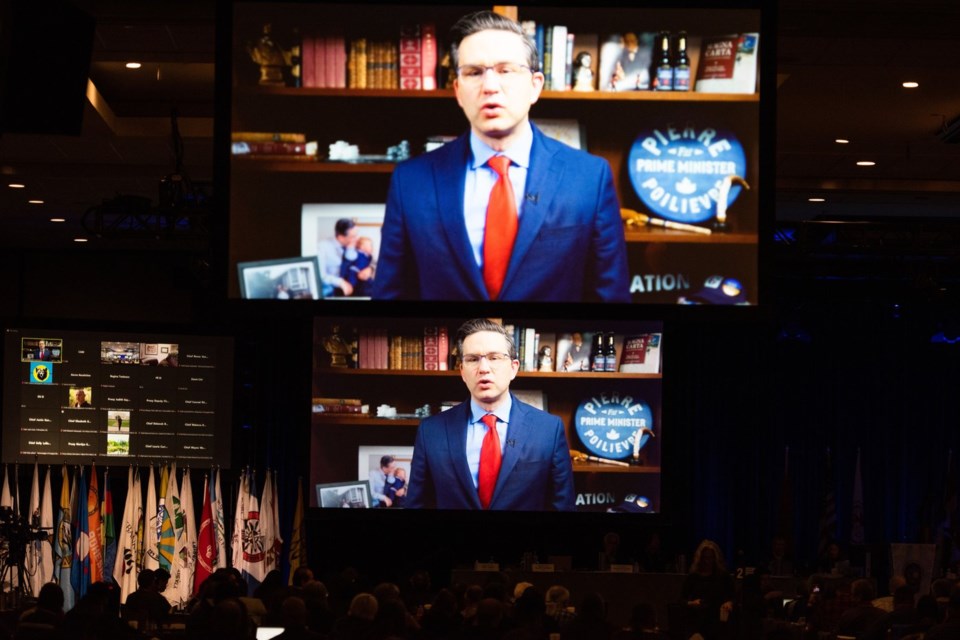OTTAWA — Conservative Leader Pierre Poilievre is set to attend the Assembly of First Nations' upcoming annual general assembly for the first time since he took the party helm.
Spokesman Sebastian Skamski said Poilievre will attend the assembly's meeting next month in Montreal and deliver a keynote address. Poilievre is also set to participate in a question-and-answer session with chiefs, some of whom have expressed skepticism about his promises on reconciliation.
Nipissing First Nation Chief Scott McLeod says he's expecting Poilievre to bring specifics on policies--not platitudes.
"We want to hear what he's actually going to do. Not what the other guy is doing wrong," McLeod said.
The Tory leader has previously met with chiefs to tell them that he would stay out of their way as prime minister, especially when it comes to generating economic growth for their communities.
Prime Minister Justin Trudeau and NDP Leader Jagmeet Singh have previously attended the assembly. A spokesperson for the NDP confirmed Singh will also be present for this year's meeting.
Poilievre's planned attendance comes as a newly elected national chief is attempting to make inroads with the party after tensions with past Conservative governments.
Earlier this year, national chief Cindy Woodhouse Nepinak said she wanted to be "optimistic" Poilievre would work with First Nations if he wins the next election, adding young people were especially frustrated when Stephen Harper was in power.
"That's certainly not the relationship that I want to see," she said.
Harper's government saw one of the largest Indigenous rights movements in recent times, Idle No More. The movement was sparked by the Conservative government's introduction of the omnibus Bill C-45, also known as the Jobs and Growth Act, and picked up steam in November 2012.
Indigenous Peoples said the bill would diminish their rights, while giving governments and businesses more authority to develop resources without a strict environmental assessment.
The protest movement grew to encompass environmental and Indigenous rights more broadly, and earned widespread support among Indigenous Peoples across the country — and the world.
Poilievre previously addressed the assembly with a video message in December 2022, which received boos from some in attendance.
Nipissing First Nation's McLeod went up to the microphone on the assembly floor afterward urging organizers to "never put a video like that ahead of our residential school survivors," which led to applause from those in attendance.
Many Indigenous Peoples remember Poilievre for comments he made on the day Harper delivered an apology to residential school survivors in the House of Commons in 2008.
Speaking with CFRA News Talk Radio before the apology, Poilievre said he wasn't sure Canadians were "getting value for all this money" — money to compensate former students who were forced to attend residential schools. He apologized shortly after.
The Indian Residential Schools Settlement, which was implemented in September 2007, allocated $1.9 billion for former students.
In an interview Tuesday, McLeod said Poilievre has a "very steep hill to climb."
McLeod, who is set to be in attendance for the assembly, doesn't want Poilievre to "talk in circles around empowering First Nations and using all these buzzy words," he said.
"What is his platform with Indigenous Peoples? What is he planning on doing? Will he support the initiatives that are already in progress?"
McLeod said Poilievre owes it to Indigenous Peoples to provide details, and "not just have him say things that he thinks we want to hear."
Poilievre has attempted to make inroads of his own with First Nations, including by announcing earlier this year a way for them to collect taxes from industry that he says would speed up negotiations and project approvals.
The policy was developed by the First Nations Tax Commission, an arm’s-length body that works to support First Nations taxation, and brought to the party.
Still, many chiefs remain skeptical and fear a potential Conservative government would cut funding for communities, leading to a period of austerity.
They are concerned it could mark the end of an era, launched by grassroots Indigenous Peoples and leadership under the Idle No More movement and partly brought about by Trudeau's Liberals, that has centered around nation-to-nation relationships. It has seen increased funding for services that have been underfunded by generations of government.
When Poilievre speaks about reconciliation, his focus is often on economic development in communities and for Indigenous Peoples to reap the rewards of natural resource development. First Nations leaders, meanwhile, are increasingly speaking of land back, or the restitution of Indigenous territory.
Poilievre, when announcing the First Nations resource charge, said the "Ottawa-knows-best approach has been poverty, substandard infrastructure and housing, unsafe drinking water and despair."
"Putting First Nations back in control of their money and letting them bring home the benefits of resource development will get faster buy-in for good projects to go ahead."
This report by The Canadian Press was first published June 25, 2024.
Alessia Passafiume, The Canadian Press

